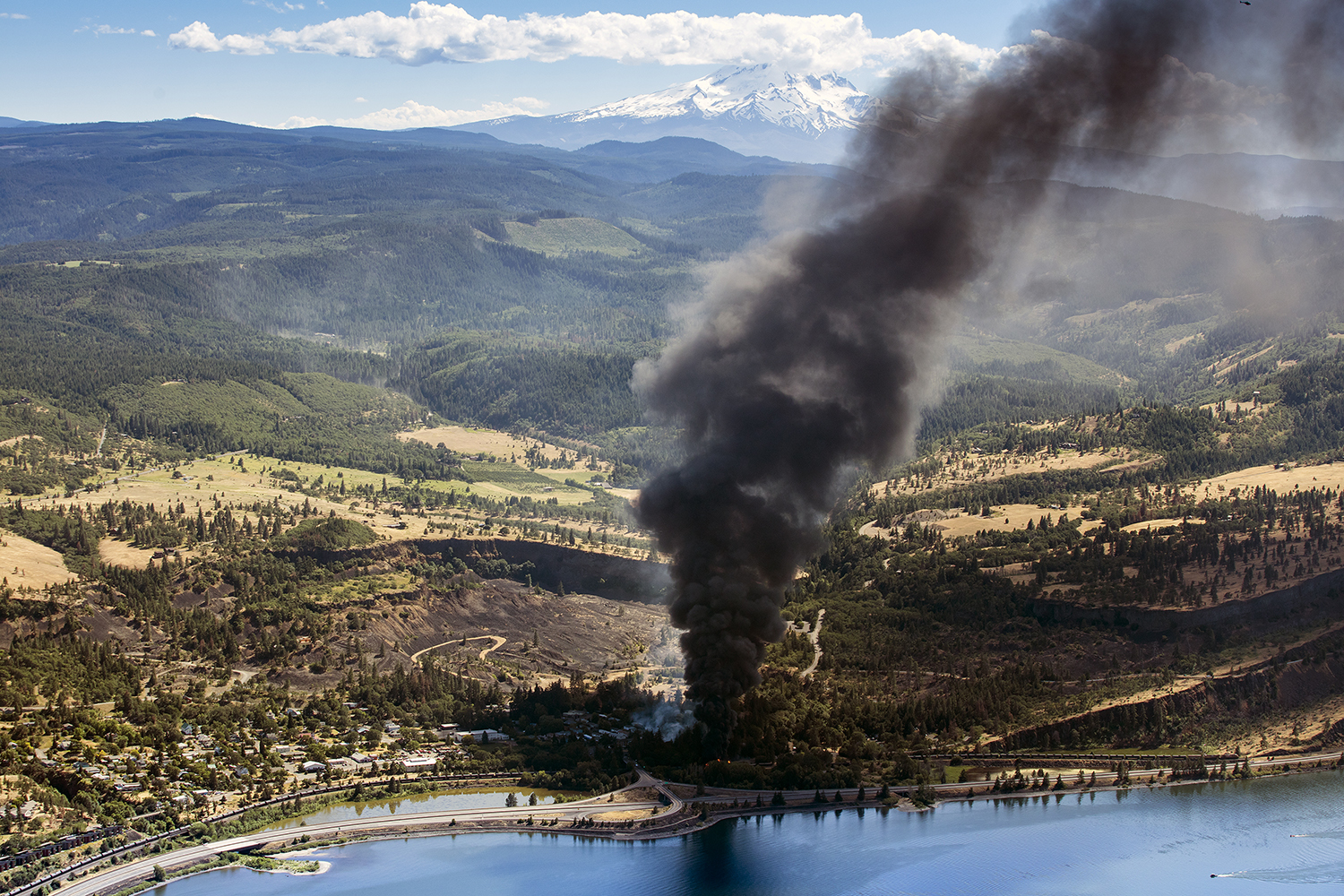Mosier, Ore., is a small town; roughly 430 people live in a half-square mile quadrant along the southern bank of the Columbia River. When a Union Pacific train carrying crude oil derailed and burst into flames on June 3, sending a giant plume of caustic black smoke billowing into the sky, residents were temporarily evacuated, at least 42,000 gallons of crude were spilled, and the town’s water treatment plant was damaged, so residents couldn’t trust their toilets or showers or drinking water for several days (the boil-water advisory was only lifted at 7 p.m. on June 6).
According to Mosier Fire Chief Jim Appleton, the only reason the disaster wasn’t catastrophically worse is because the 35 mph wind that was blowing a day earlier had died down. It’s easy to imagine that with a wind like that, the other 96 cars down the line could have exploded, rather than just 4.
Union Pacific says it will pay for the cost of cleanup, and in this case, it’s likely that it can. The damage is manageable and contained. No one was hurt or killed. But if the same thing happened in downtown Seattle, there’s no telling the cost — to public utilities, to property, and to human lives.
A similar explosion here would be “a nightmare scenario,” says Eric de Place, policy director for the Sightline Institute, and this disaster unscores that we now have “all the evidence we need to just flat out deny” crude-by-rail, period. Part of the reason, he says, is that everything that happened in Mosier was actually a best-case scenario. The train cars were the newest, safest model (not the old, rickety DOT-111 tanks that the city of Seattle passed a resolution to ban last year). The tracks were “high-quality, Class 1 track that is inspected twice a week.” The oil inside had been “degasified,” a safety process that the federal Pipeline and Hazardous Materials Safety Administration has ruled should be required for the volatile crude coming from the Bakken.
Also, the wind wasn’t blowing. It was daytime. There weren’t thousands of people in a mile radius of the spill. This disaster “is almost a perfect example of what is wrong with the [oil train] industry,” de Place says. “It’s an overused analogy, but we’re playing Russian roulette. I keep wondering… do people need to die again before we just deny these projects?”
And even if no one gets hurt, the sheer financial cost of the damage can be colossal. In Lac-Megantic, Quebec, where 47 people died because of an oil train explosion in 2013, the price of cleanup alone topped $3 billion. The rail company reponsible for the disaster had just $25 million in disaster insurance, and went bankrupt immediately; Canadian taxpayers have been paying for it ever since. As several Sightline investigations have found, rail companies as a whole simply do not have the necessary backing from their insurers to come even close to being prepared for the kind of disaster that everyone — from environmental groups to activists to politicians — says is very, very likely to happen again.
The derailment in Mosier “just highlights once again that these trains are dangerous,” says Councilmember Mike O’Brien, who was involved in developing the city’s oil train safety resolution last year. “They do derail. The oil in them is highly explosive. The cars leak when they tip over. This is the same story again.”
And Seattle’s resolution, O’Brien says, is just that — a resolution. It asks railroad companies to consider safety and transparency issues, but because railroads are under federal jurisdiction, “despite doing over a year’s worth of work, and hiring national legal experts on railroad law, we could find nothing we could do to compel the railroads to do anything.”
Nevertheless, Governor Inslee signed a bill last year designed to increase oil train safety in the state of Washington, and the Department of Ecology is in the process of holding public hearings on five policy initiatives the bill requires, including advance notice of oil movement and railroad contingency planning.
“I was sitting in one of the [oil train safety] rulemaking hearings in Vancouver, Washington, when my phone started to ring,” says Columbia Riverkeeper conservation director Dan Serres. “It was like, ‘I’m sorry, I have to go. There’s an oil train fire in Mosier right now!’” Now, more than ever, it feels to both Serres and de Place that we are simply incapable of making these trains safe enough, no matter how hard we try. “A lot of the testimony” that Ecology received that day, Serres says, was, “‘We appreciate your efforts, but there’s only one way to deal with these things, and it’s to prevent these oil trains from coming down the Gorge.’ What we saw on Friday was not an accident,” Serres says. “It was the forseeable result of shipping oil down the Columbia River.”
Inslee’s oil train safety bill also required that the Utilities and Transportation Commission establish new rules in early 2016. Among them is the stipulation that railroad companies must be transparent in their annual financial reports to the UTC regarding their ability to pay up in the event of a “reasonable worst case spill.”
The UTC’s definition of “reasonable,” however, is a vast underestimation, according to a Sightline analysis.
“There is still, particularly in a few places, a big shortfall between what the state of Washington estimates” is a reasonable spill “and what the railroads carry” in liability insurance, says de Place. “Forget about all the environmental arguments, about health and safety. Just think about it from a market perspective. The insurance industry, they assess risk and they price it and they sell you policy for it. The railroads can’t purchase enough insurance” to take care of the kind of risks they’re taking on. “That’s just the private marketplace saying, ‘This is bananas. You shouldn’t do it.’”
O’Brien says that part of the city’s oil train safety resolution includes an attempt to get more information on railroad liability insurance. But Seattle doesn’t have the authority to tell the railroads what kind of insurance to carry. If an explosion happened here, he says he’s not sure what would happen, “but I suspect we’d be left holding the bag. I assume we could ask the governor or the federal government to make it a federal state of emergency. But that still means taxpayers in one form or another are paying for it.”








